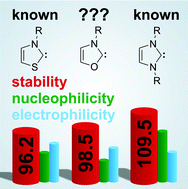Oxazol-2-ylidenes. A new class of stable carbenes?†
Abstract
The investigation of the stability of several imidazol-2-ylidene analogue cyclic

Maintenance work is planned for Wednesday 1st May 2024 from 9:00am to 11:00am (BST).
During this time, the performance of our website may be affected - searches may run slowly and some pages may be temporarily unavailable. If this happens, please try refreshing your web browser or try waiting two to three minutes before trying again.
We apologise for any inconvenience this might cause and thank you for your patience.
* Corresponding authors
a
Department of Inorganic and Analytical Chemistry, Budapest University of Technology and Economics Szt, Gellért tér 4, Budapest, Hungary
E-mail:
nyulaszi@mail.bme.hu
Fax: +3614633408
b Wilhelm-Ostwald-Institut für Physikalische und Theoretische Chemie Universität Leipzig, Linnéstr. 2, D-04103 Leipzig, Germany
c Materials Structure and Modeling Research Group Hungarian Academy of Sciences, at Budapest University of Technology and Economics Szt, Gellért tér 4, Budapest, Hungary
The investigation of the stability of several imidazol-2-ylidene analogue cyclic

 Please wait while we load your content...
Something went wrong. Try again?
Please wait while we load your content...
Something went wrong. Try again?
Z. Kelemen, O. Hollóczki, J. Oláh and L. Nyulászi, RSC Adv., 2013, 3, 7970 DOI: 10.1039/C3RA41177J
This article is licensed under a Creative Commons Attribution 3.0 Unported Licence. You can use material from this article in other publications without requesting further permissions from the RSC, provided that the correct acknowledgement is given.
Read more about how to correctly acknowledge RSC content.
 Fetching data from CrossRef.
Fetching data from CrossRef.
This may take some time to load.
Loading related content
